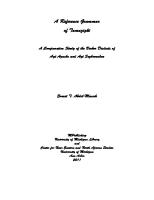Comparative and Superlative Adverbs [PDF]
Comparative and superlative adverbs Many adverbs can have three different forms, the positive, the comparative, and the
36 1 332KB
Papiere empfehlen
![Comparative and Superlative Adverbs [PDF]](https://vdoc.tips/img/200x200/comparative-and-superlative-adverbs.jpg)
- Author / Uploaded
- Jesica González
Datei wird geladen, bitte warten...
Zitiervorschau
Comparative and superlative adverbs Many adverbs can have three different forms, the positive, the comparative, and the superlative: Positive Comparative
Superlative
loudly
more loudly
most loudly
fast
faster
fastest
well
better
best
The comparative form is used for comparing two actions or states: She ate her lunch more quickly than Joe (did). Can’t we go any faster? The company performed better this year (than last year). I made my cough sound worse than it actually was. The superlative is used for comparing one action or state with all the others in the same category: The first stage of a divorce passes the most quickly. We need people who are determined, not just those who can run the fastest. He’s playing the kind of role that suits him best. Worst of all, we didn’t have the rights to our own films. Note that it’s not possible to have comparatives or superlatives of certain adverbs, especially those of time (e.g. yesterday, daily, then), place (e.g. here, up, down), and degree (e.g. very, really, almost).
Forming comparative and superlative adverbs There are three ways in which the comparative and superlative of adverbs are formed, depending on the spelling of the base adverb: Adverbs ending in -ly Add the word more to make the comparative, and the word most to make the superlative: adverb comparative
superlative
slowly
more slowly
most slowly
happily
more happily
most happily
Adverbs with the same form as an adjective These form their comparatives and superlatives by adding the endings -er and -est. If the adverb ends in -y, then you change the y to an i before adding -er or -est; if the adverb has one syllable and ends in -e, then you just add the ending -r or -st: The most common adverbs of this type are: early
earlier
earliest
fast
faster
fastest
hard
harder
hardest
high
higher
highest
late
later
latest
long
longer
longest
low
lower
lowest
near
nearer
nearest
soon
sooner
soonest
Irregular comparatives and superlatives Some common adverbs have irregular comparatives and superlatives that you just have to learn. Most dictionaries will also give these spellings if you’re not sure: badly worse worst well
better
best
little
less
least
much
more
most
far
farther (or further)
farthest (or furthest)









